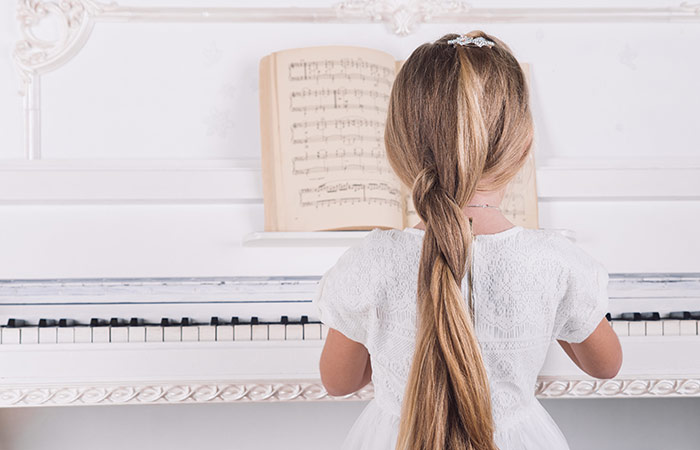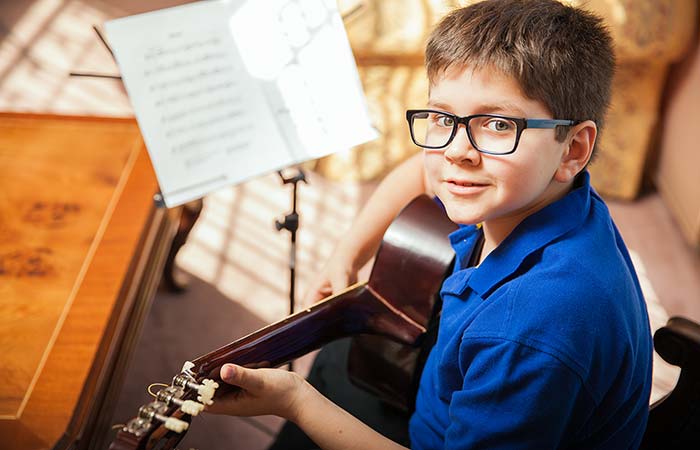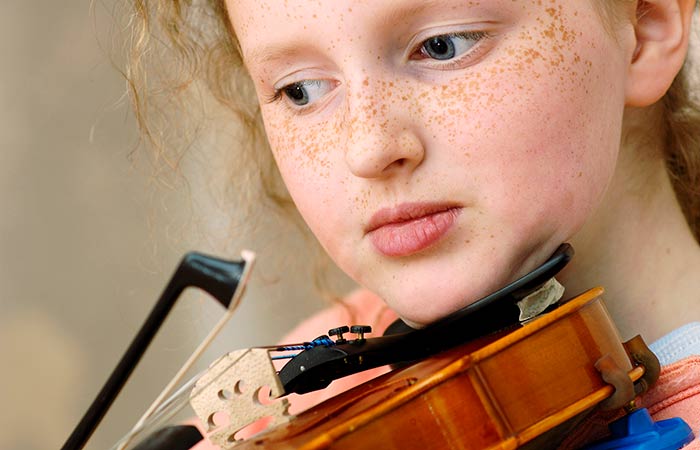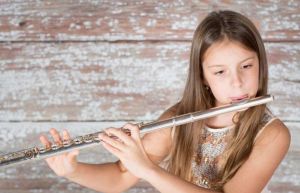“Ear training is the process of connecting music theory (notes, intervals, chords, scales, melodies, etc.) with the sounds we hear. In other words, studying ear training is building a bridge between the language of music and the sounds that are designated by that language.
The more we train our ear to recognize this connection, the better we get at playing music, because we learn to understand what we play and to anticipate musical structures”. Written by Ear Master
The ear is the most important of the five senses used when it comes to music and musical training. If one logically understands that music is heard, perceived and experienced only through the ear or rather primarily through the ear by the hearing of music, or listening to music, or performing of music, one will quickly come to the conclusion that the ear and training of your ear should be seen as of major importance. Everything turns around your ear and “hearing” of the music and the sounds produced.
There are different mindsets around playing or performing by ear or playing primarily by sight. Some musicians do not advocate playing by ear as really important, and some do not regard note reading as important, but rather playing by ear. I do believe that both playing by ear and playing by notes are of utmost importance to the real musician.
The ear in the development of your child
- The ear plays an enormous role in the development of your child and it is a well-known fact that even the unborn baby in the mother’s womb already hears music and sounds, and all really knows the mother’s voice.
- Through the ear, your child perceives, hears, comes to understanding and feels emotions. Therefore giving attention to the development of your child’s ears is very important.
- There is no other genre that helps with the development of the ear of your child, like learning to play an instrument or learning to play music.
- It’s also a fact that soft restful music helps children to sleep instead of fast boisterous energetic music. All of this is perceived by the ear of the individual.
- Music plays such an important role in the life of the youngster and letting your child learn music from an early age only gives them an edge and the ability to choose good music from an early age.
- The ear is also linked to the emotions evoked by hearing, Your child can easily differentiate from the sound of your voice whether you are happy, or sad, or whether you are angry.
- This is just to name a few things why ear development is important and especially when it comes to music. As I’ve already mentioned, music is perceived by the ear and the development of the ear in the young child is important as is the importance of the ear when studying music.
‘Aural skills’ are musical listening skills that develop your ability to hear specifically in regards to music and sound, and ear training is the process of developing these skills. For example, if you can listen to a song on the radio and play or sing it back, you have been training your ears.23 Feb 2017 www.musical-u.com › Ear Training
Note reading vs playing by ear
A lot of attention is given to note reading and theory of music in the classical arena. Note reading, of course, plays a major role in classical music, seeing that note reading is needed to be able to read the music score written by a specific composer. The using of the ear, however, is more important than note reading in general because of the obvious reasons I’ve already covered. Music is heard by the ear, not by reading notes. Good interpretation and expression are executed by having a good “listening” ear.
Ear training in classical music
In classical music, musical training or musicianship (as it’s called) is part of the external musical exams of ABRSM and Trinity College of Music London. According to these music schools, ear training plays an important role in your development as a musician and forms an important part of the exam. Students are trained to be able to recognise specific cadences, sing notes on pitch, keep the beat, hear chords and minor or major keys etc.
Developing listening skills
There is one aspect which I sometimes find lacking in students learning to play classical music. Many students are quite capable of reading notes but often have not been trained to develop their ears in really listening to what they are playing, or how they are playing while reading music. This area needs very specific attention when playing classical music. The reading of notes can not dominate the hearing of your playing. I remember studying piano with Mr Josias V d Merwe, a master professor at the Technikon in Pretoria. He made great note of having to listen to what you are playing, by not only “hearing” the music, but actually giving distinct attention to the creation of sound, melody, phrase, and interpretation of the music you were reading by listening intently or intentionally to your sound production, how the melodic line is developed etc, This listening skill plays a very important role in performing and interpretation in music. This needs to be taught from a young age.
Intentional listening skills
Sadly, I even found myself playing many times without really listening. I would be hearing myself playing but not really giving attention to the “hearing” of the melodic line or the phrase or the sound that I was creating. This intentional listening requires a higher level of discipline. I had to force myself to really listen and create beautiful sounds or music. As we all know, you sometimes speak to your child and your child will even answer but in the end, you find that they did not really hear at all. It’s much the same in playing without hearing or concentrating on the hearing of your playing. Sometimes one can play a whole piece of music while thinking about many other things. When this happens, it’s time to have a break and not just waste your time, unless it’s part of your relaxation for the day!
“Hearing” is most important for the interpretation of music
Being able to really listen and really hear the key, the tones, the notes, the chords, the melodic line, etc in classical music, plays an enormous role when it comes to interpretation. It places you on another level when you can really “hear” your music.
Sometimes the hearing with the ear is overlooked and too much attention given to reading the score. Being able to hear a minor or major chord or a dominant seventh chord and it’s resolving helps the student to be able to remember the work in a better way without forgetting it.
Ear training as part of every lesson and practice
For your child training can be specifically enhanced when the teacher gives attention by training your child to be able to sing the melody they are playing, as well as reading it. Your child needs to be taught how to hear the chords, key and notes. Many times no attention is given to ear training until just before the exam. For most of us, this worked fine, but it’s so much more effective when training becomes part of the normal piano lesson. The best would be to naturally be aware of your ear training and making it part of every week’s lesson.
The best way of ear development by working out songs by ear
One of the best ways to develop the ear would be to take a piece of music or a song and listen to it by ear. Then try to work it out by ear without music. I found this the best way to develop the ear. There are many songs available on the Internet that you can use. You can even use the simplest children’s songs to start with. Choose a song and try to pick out the melody by ear on your piano or on your instrument. In the beginning, it might be quite hard to really hear which notes to play and how the melody is moving but as it’s practised weekly it will become natural for you to easily transcribe the melody by ear. Soon your ear will start to adjust to hearing moving up or down, intervals used and chords.
How to develop playing by ear and develop your hearing skills
For me personally, playing by ear was at first quite difficult as for years I was classically trained only with the reading notes. Playing by ear or working out melodies heard, was not part of our curriculum. Therefore playing by ear was not a natural ability for me at first. The turnaround came after I’ve studied 4 years of classical full-time music at a music institute. All the students performed their end year concerts and I played some great classical pieces of 28 or 30 pages of written music, all committed to memory just to find that around six months later I had already lost a great deal of the pieces from memory. This really frustrated me. I also had my brother come and visit with a friend and they asked me to play the piano because I was, of course, the “fundy” in piano playing. I was the one who had been trained for four years in musical performance and should be a great performer. Of course, I still knew a lot of pieces plus had superb technique, but I found myself not being able to play totally through a single piece which I played perfectly on the concert night!
Then my brothers asked his friend to play something too. She had no music training except for maybe one or two lessons, but she sat down in front of the piano and started a play and play and play with music flowing from her hands effortlessly. Of course, it wasn’t difficult classical music pieces she was playing, but you can quite imagine my frustration!
Learning a song by ear and improvising on it until you mastered it!
I was highly upset because this girl had no specific training and I had years of experience in classical training. Hours and hours of non-stop practising to be able to play concerts and yet I couldn’t play a simple song by improvising on it and playing by ear! That day I decided that this scenario was going to change. I tried to follow what she was doing on the piano, then took one song which I loved and worked out the melody. Then I worked out the basic chords etc. I decided that I would stick to this one song even if it took me a year to learn to improvise and play by ear.
Well it was worth it and since then playing by ear became easy and a great tool even in classical playing. Suddenly I could improvise on Mozart or Beethoven. What a great privilege. Of course, playing by ear and developing your ear never stops. There are always new voicings, new melodies and harmonies to add to your ear vocabulary!
Doing jazz to develop your ear
Later I enrolled in jazz because I felt I wanted to conquer another genre or another area of music on the piano. It was very challenging because it’s quite different from the classical genre. In this period master guitarist, Stefan Joubert told me once to remember that your “ear memory is more important than eye memory”. Up to that stage I was giving attention to eye memory and “remembering” with my mind which chords was played like in the moonlight sonata. I was never taught about ear memory. I would work out the chords and memorise the harmonies. I would remember the melody with my eyes and with continuous repetition would commit it to memory. Of course, I was listening, but not with a memory mindset of sound.
Ear memory developed
After the remark about ear memory, I started to really think about ear memory is more important than eye memory. I then actively changed my way of learning pieces of music by specifically giving attention to the ear. I tried to hear the chords, hear the melody and re-learnt my old classical piano pieces without the score by hearing the music in my ear and trying to work it out. With this new way of learning, only referring to the music when I really was stuck, I found something which is extraordinary. I found that I could not really forget what I was learning anymore because with my ear, my fingers knew where to play and I did not have to try and use my mind to remember the page or the notes. It was all inside me, in my ear memory. I do want to encourage you as a classical student that you specifically give attention to hearing with your ear when you are learning a piece of music. Learn not so much from the notes itself, but from the sound or melody, it spells.
In the next article, we will discuss various exercises one can do to develop your ear more effectively.







